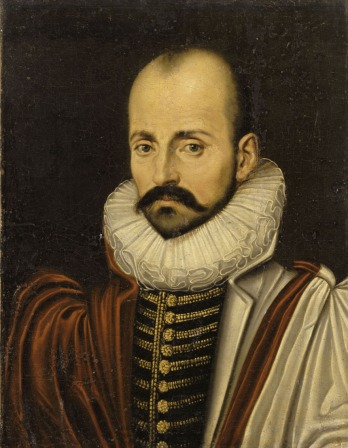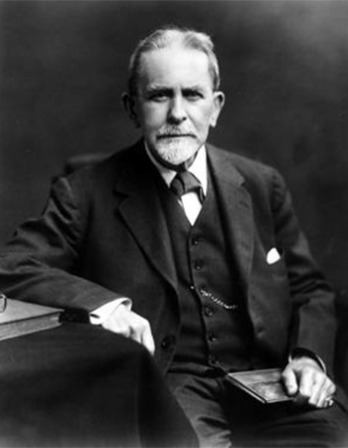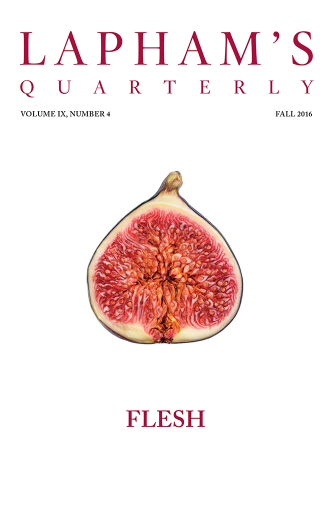When you have only two pennies left in the world, buy a loaf of bread with one, and a lily with the other.
—Chinese proverb,Holy Communion
Alexander von Humboldt stares into the image of infinity.
In considering the study of physical phenomena—not merely in its bearings on the material wants of life, but in its general influence on the intellectual advancement of mankind—we find its noblest and most important result to be a knowledge of the chain of connection by which all natural forces are linked together and made mutually dependent upon each other; and it is the perception of these relations that exalts our views and ennobles our enjoyments. Such a result can, however, only be reaped as the fruit of observation and intellect combined with the spirit of the age in which are reflected all the varied phases of thought. He who can trace through bygone times the stream of our knowledge to its primitive source, will learn from history how for thousands of years man has labored amid the ever-recurring changes of form, to recognize the invariability of natural laws, and has thus, by the force of mind, gradually subdued a great portion of the physical world to his dominion. In interrogating the history of the past, we trace the mysterious course of ideas yielding the first glimmering perception of the same image of a cosmos, or harmoniously ordered whole, which, dimly shadowed forth to the human mind in the primitive ages of the world, is now fully revealed to the maturer intellect of mankind as the result of long and laborious observation.
Nature considered rationally, that is to say, submitted to the process of thought, is a unity in diversity of phenomena, a harmony, blending together all created things however dissimilar in form and attributes, one great whole animated by the breath of life. The most important result of a rational inquiry into nature is, therefore, to establish the unity and harmony of this stupendous mass of force and matter, to determine with impartial justice what is due to the discoveries of the past and to those of the present, and to analyze the individual parts of natural phenomena without succumbing beneath the weight of the whole. Thus, and thus alone, is it permitted to man, while mindful of the high destiny of his race, to comprehend nature, to lift the veil that shrouds her phenomena, and as it were, submit the results of observation to the test of reason and of intellect.
In the uniform plain bounded only by a distant horizon where the lowly heather, the cistus, or waving grasses deck the soil; on the ocean shore where the waves softly rippling over the beach leave a track green with the weeds of the sea; everywhere the mind is penetrated by the same sense of the grandeur and vast expanse of nature, revealing to the soul by a mysterious inspiration the existence of laws that regulate the forces of the universe. Mere communion with nature, mere contact with the free air, exercise a soothing yet strengthening influence on the wearied spirit, calm the storm of passion, and soften the heart when shaken by sorrow to its inmost depths. Everywhere in every region of the globe, in every stage of intellectual culture, the same sources of enjoyment are alike vouchsafed to man. The earnest and solemn thoughts awakened by a communion with nature intuitively arise from a presentiment of the order and harmony pervading the whole universe, and from the contrast we draw between the narrow limits of our own existence and the image of infinity revealed on every side, whether we look upward to the starry vault of heaven, scan the far-stretching plain before us, or seek to trace the dim horizon across the vast expanse of ocean.
If I might be allowed to abandon myself to the recollections of my own distant travels, I would instance among the most striking scenes of nature the calm sublimity of a tropical night when the stars, not sparkling as in our northern skies, shed their soft and planetary light over the gently heaving ocean; or I would recall the deep valleys of the cordilleras where the tall and slender palms pierce the leafy veil around them, and waving on high their feathery and arrow-like branches, form, as it were, “a forest above a forest;” or I would describe the summit of the Peak of Tenerife when a horizontal layer of clouds, dazzling in whiteness, has separated the cone of cinders from the plain below, and suddenly the ascending current pierces the cloudy veil so that the eye of the traveler may range from the brink of the crater along the vine-clad slopes of Orotava to the orange gardens and banana groves that skirt the shore. In scenes like these, it is not the peaceful charm uniformly spread over the face of nature that moves the heart, but rather the peculiar physiognomy and conformation of the land, the features of the landscape, the ever-varying outline of the clouds, and their blending with the horizon of the sea, whether it lies spread before us like a smooth and shining mirror, or is dimly seen through the morning mist. All that the senses can but imperfectly comprehend, all that is most awful in such romantic scenes of nature, may become a source of enjoyment to man by opening a wide field to the creative powers of his imagination. Impressions change with the varying movements of the mind, and we are led by a happy illusion to believe that we receive from the external world that with which we have ourselves invested it.

Alexander von Humboldt
From Cosmos. Von Humboldt was the most famous of the early nineteenth century’s naturalists and explorers. Indefatigably curious and abundantly prolific, von Humboldt conducted his major investigations in Central and South America. Twelve towns, nine bodies of water, six mountains, and one lunar crater bear his name.




